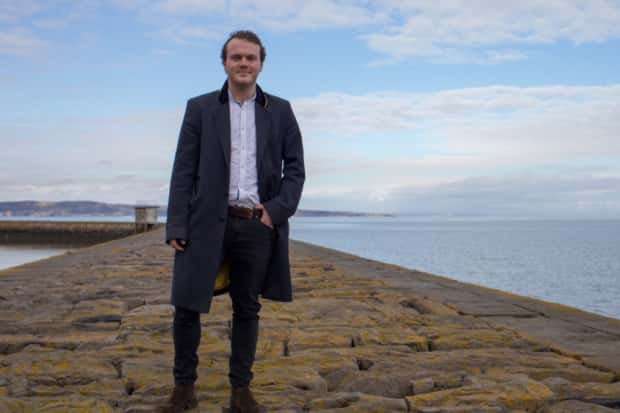A Scottish entrepreneur has developed a new eco-friendly bottle that could help combat the growing mountain of plastic litter entering the world’s oceans.
Edinburgh-based chemistry graduate James Longcroft launched a not-for-profit bottled water firm two years ago, with the aim of ploughing all profits into a charity focused on providing clean drinking water to remote communities in Africa.
Inventor James Longcroft on Granton Harbour Wall
But the 27-year-old soon realised the product, although it was benefiting struggling villagers in some of the world’s poorest regions, was adding to an increasing blight on the environment.
So last year he vowed to go plastic-free – his company, Choose Water, has sold no plastic bottles since.
But that meant he had to find another way to continue funding the charitable works.
After months of experiments at his kitchen table, he has now managed to create a novel bottle that he believes could revolutionise the industry.
The prototype of the biodegradable bottle, which uses no fossil fuels in its production
It is fully biodegradable, made from sustainable plant-based materials, uses no fossil fuels in its production and can actually benefit wildlife and the landscape when it breaks down.
The plastic-free container decomposes within about three weeks in seawater, compared with hundreds, even thousands, of years for its plastic equivalent. It can also be harmlessly eaten by sea creatures and can neutralise acidic soils.
Longcroft said: “My fiancée was in dismay when I was trying to create the bottle as it was very messy. But we’ve got a base in Fife now that has allowed us to develop a viable prototype.
“The liner is the key. The outside is made from recycled paper, but the inside had to be waterproof, provide strength so the bottle would retain its structure, and keep the water fresh – just like plastic.
“We’ve managed to do all that, which is pretty exciting.
“It’s made with a combination of natural, sustainable materials. I’ve just mixed some stuff together from trees and plants – they’re all natural.
“The ingredients were developed by nature and are by-products of larger industries, which makes them competitively priced when compared with plastics.”
Now he wants to roll out production from a new Fife premises. To do this he hopes to raise at least £25,000 to buy new moulds and machinery to produce the bottles on a commercial scale.
“We only have one planet and we need to act now to make sure we protect it for future generations,” said Longcroft.
“We really want to get our bottles on shelves and into people’s hands as soon as possible – if we can stop even one plastic bottle ending up in the environment it will be worth it. The main hurdle we face is breaking into a saturated market and competing with an old and established industry.
“Changing an industry will be a massive uphill battle but with the public’s support we will change the way we look at bottled water.
“It doesn’t look shelf-ready yet because we need to get new moulds and new machinery, which is why we’re crowd-funding.”
But Longcroft is eager to keep control of his invention. “We want to launch it ourselves, because it can do great things for charity – any profits we make will go to help poor communities in Africa get access to safe, clean drinking water. But I want it to go global.”
The prototypes are hand-made and the water is sourced from England, but the inventor is in talks with spring owners in Scotland with a view to creating a Scottish bottled water.
Longcroft is launching his crowd-funding drive on Tuesday, looking for backers to help get his vision off the ground. Details are available at https://www.ch2oose.co.uk/.
The Scottish Government has pledged to introduce a deposit-return system for plastic drinks containers and is set to outlaw the manufacture and sale of plastic-stemmed cotton buds north of the border.
Westminster has laid out an intention to “eliminate all avoidable plastic waste” within 25 years.

Stoopidee on May 2nd, 2018 at 12:34 UTC »
Will it biodegrade into my water while I'm drinking it?
OrderAmongChaos on May 2nd, 2018 at 11:55 UTC »
We already have hundreds of "biodegradable plastics."
This is generally what happens:
Too expensive to produce Can't withstand high temperatures Begins degrading during shipment Dissolves into the product it's meant to contain Ends up being a major cancer risk or health hazard, even when compared to commercial plasticI'm not going to hold my breath.
lampishthing on May 2nd, 2018 at 11:39 UTC »
The big questions are whether it's cheap enough to compete with plastic bottles, and is the process scalable? Biodegradable materials are not all that new!